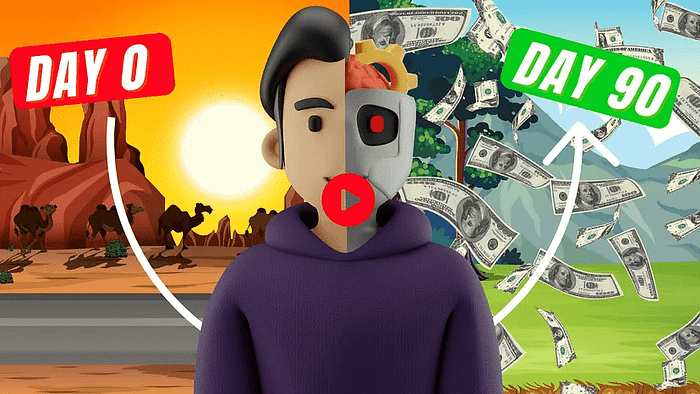4 Millionaire Skills I Wish I Knew at 18
Mastering the art of acquiring millionaire skills at a young age can be a game-changer for anyone seeking financial success. When I was just 18, I had no idea that the skills I would soon learn would propel me from working out of my humble bedroom with a mere $50 in my bank account to earning six and eventually seven figures per month.
In this blog post, I will share with you the four essential skills that transformed my life and helped me achieve millionaire status in my 20s. These millionaire skills are not just about making money; they are about developing a mindset and a set of abilities that will serve you well in every aspect of your life.
We strongly recommend that you check out our guide on how to take advantage of AI in today’s passive income economy.
Table of Contents
Skill #1: Asking Strangers for Money (Sales)
My journey began when I was just 16 years old, working out of an old shipping container selling ink cartridges over the phone. It was a brutal introduction to the world of sales, but it taught me invaluable lessons about human psychology and communication.
Imagine being on the front lines of capitalism, getting your teeth kicked in day after day. It’s like a cold, hard slap to the face, but it’s also an incredible opportunity to learn and grow. After my first 8 weeks, I was making $1,800 per week, just shy of $100,000 per year.
Nothing teaches you more about human psychology and forms your character more than getting abused and bruised up on the telephone all day long. It teaches you what gets people to listen, what gets them interested, and what payoffs you have to promise to even get a second of their time.
Regardless of what you choose to do for the rest of your life, having already faced so much rejection will make all the hardships you encounter seem easier in comparison. It’s like having a constant grind and rejection on you for long, extended periods of time.
Comedians are some of the best communicators in the world. They go from venue to venue, city to city, show to show, literally split testing every single nuance of what they say to make their jokes hit and land. They’ll change their inflection, add a pause, and gauge the reaction from the crowd.
When you’re on the telephone doing high-frequency sales, every single second of those calls is earned. If you pause for too long or upward inflect at the start of your call, reeking of being a salesperson, you’ll get hung up on immediately. This forces you to become extremely precise in the way you speak, which is everything because communication is a fundamental part of everything you do all day long.
My tips for getting into sales are to start at the bottom, selling something for a cheap price so you can get lots of reps in. As your skill level increases over the years, move on to higher and higher ticket items. The millions are made in selling the most expensive products out there, and believe me, it’s no more difficult to sell something for $15 than it is to sell something for $500,000. I’ve sold both.
Skill #2: The Art of Deal Making and Negotiation
Deal making and negotiation are skills you use every single day. Competent and silent people get ignored, and everything is negotiable, so you better damn well get good at it. The way to improve is, like anything else, to get the reps in. Start negotiating like it’s a sport, anywhere and everywhere you possibly can.
I became the assigned negotiator for my whole family. If they wanted to buy a couch, a camera, or an old computer, I would be the person to sort it out. You learn the best way to communicate, whether it’s via text or getting someone on the phone, and how long to wait before getting back to them. These are all things you begin to learn the more reps you get in.
For many people, negotiating feels very unnatural. They simply don’t like it. A great challenge to get out of your comfort zone is to ask for discounts in the most ridiculous places you can think of, like your local coffee shop or even a gas station. If the thought of asking for a 10% discount on your coffee makes you uncomfortable, that’s a telltale sign that it’s something you need to do. If you don’t ask, you don’t get, and the way to get good at asking is to ask more.
Here are some of my tips for negotiating:
- The person who cares the least is the one in a position of power. If you really need the deal, the other person can feel it, they can smell it on your breath. The best thing to do is put yourself in a position where you have options, so you’re not afraid to walk away from the deal.
- In a price negotiation, the person who says the price first loses. Do anything in your power to get the other party to reveal their starting point. They’ll either highball you or lowball you, depending on whether you’re asking or receiving in the negotiation.
- When they state their price, don’t react. Be silent and nonchalant, no matter what number comes out of their mouth. People hate confrontation and aren’t used to negotiating. Get comfortable with sitting in an awkward pause, allowing yourself time to think, and then play your hand.
- Set specific deadlines. A negotiation doesn’t go on forever; there is a defined deadline for when it will end.
- Find out what is most important to the person you’re negotiating with. Is price the only thing they care about, or are they more concerned about the terms? Do they just want to get the thing sold immediately? Your job in a negotiation is to understand what is important to the other party and operate from that point of leverage.
Skill #3: Storytelling
Storytelling is not only the oldest form of communication that exists, but it’s also the most powerful. You can’t argue with a story. With all other forms of communication, people constantly have their defenses up, but when you sit down to tell a story, their defenses automatically fall to the wayside, and they become much more receptive to the information you’re sharing.
In any form of communication, people often won’t remember what you said, but they will remember how you made them feel. Story is the most powerful way to make people feel a certain way. When it comes to storytelling, we can break it down into two categories: direct response and attention hijacking (aka organic content).
When I was 21 years old, I used to wake up every morning, make myself a cup of coffee, and read a proven piece of sales copy. I read my first copywriting book and was hooked. I went from reading theoretical books about copywriting to reading proven ads, looking for patterns in how they caught attention, presented offers, created scarcity, and closed the deal. I started thinking in terms of sales messages.
My tips for getting really good at direct response copywriting are:
- Read “Scientific Advertising” by Claude Hopkins to gain a foundational understanding of old-school direct response.
- Don’t fall down the rabbit hole of only reading old-school direct response books. These authors didn’t have to compete with the chaotic blizzard that is the attention Hunger Games of the internet. No matter how good your sales message is, if nobody is consuming it, it’s useless.
- Read proven ads, sales pages, Facebook ads, video sales letters—any proven piece of advertising. A way to know if it’s proven is if you see it for long, extended periods of time, which means it’s making more money than the company is spending to advertise it.
- Get some reps in. Nothing will teach you more about writing copy than actually doing it.
The second category of storytelling is attention hijacking, or organic content. Organic content allows you to get reps in, but if you don’t want to make lots of content, build a personal brand, and start uploading videos to YouTube, TikTok, Instagram, and all the other platforms, you can still keep a story bank.
A story bank is like a Google Document where you store all the stories you come across, either in your own life or from other people, that you find fascinating. Pay close attention to the stories that grab you, whether they’re in documentaries, on Netflix, YouTube, or from content creators you follow. Listen to the story and pay attention to when you start to be on the edge of your seat, wanting to listen more. Ask yourself: Why did I consume this? How did they start the story? How did they retain my attention? How did they reward me for listening to the story?
Skill #4: Design
The fourth and final skill is one that I think is probably the most underrated yet most powerful because it compounds on all the other three skills that preceded it. It’s like this silent competitive advantage that people aren’t really aware of, but it is so, so powerful, and that is the skill of design.
When I was 16 years old, I thought I wanted to be a graphic designer. I used to spend so much time studying good design, reading design blogs, and designing a lot of things myself. Then I looked at the career of graphic design and found out how little money they made. I grew up in a house that had a lack of money, so I knew the first thing I wanted was to have a lot of money. I thought all the time I had invested in learning design was wasted until I started my agency.
I was the person actually designing the landing pages, putting together the funnels, and designing all the elements for them. Design really became a competitive advantage. People completely judge you by how something looks straight out of the gate. The way you increase how people judge you is by having clean design.
We’ve all seen those super spammy sales letters with black text on a white background, yellow highlights, big red buttons, underlines, things circled out, arrows, tickers, and all those kinds of things. Immediately, as soon as you land on those pages, you have a visceral reaction.
Whether you like it or not, people judge you by the design of your funnels, your videos, your website. Good copy is like good food, and a lot of that comes down to the presentation of that copy, not only in the words you say but in the way you package it up and the branding that supports that copy, offers, and funnels that you put out into the marketplace.
Remember the notepad I mentioned earlier? You might be thinking, “Okay, what does this notepad have to do with anything?” Well, I used to write down all of these four skills every single day in this notepad. I would wake up every morning, make myself a coffee, flip open this notepad, and just look at those core things I needed to do every single day: read the sales letter, look at design blogs, listen to sales calls, look at sales messages, read stories. Every day, I would fill this thing up over the course of the year, and then I’d have to get a new one. I still have all of these notepads to this day.
In conclusion, these four millionaire skills—sales, negotiation, storytelling, and design—are the foundational elements that took me from being a broke teenager working out of my bedroom to earning millions of dollars per month. By mastering these skills and applying them consistently, you too can achieve financial success and live the life of your dreams. Remember, it’s not just about the money; it’s about developing a mindset and a set of abilities that will serve you well in every aspect of your life. Start honing these millionaire skills today, and watch as your world transforms before your very eyes.

We strongly recommend that you check out our guide on how to take advantage of AI in today’s passive income economy.




